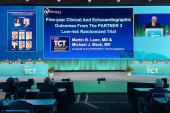My Hopes for Cardiology in 2024: More Honesty, Humility, and Collaboration
Surgeons and interventional cardiologists are now seeing a new type of valve patient: one previously treated by the other.

Two illuminating moments at meetings in the latter stages of last year struck a chord with me and have shaped my outlook heading into 2024. The first occurred at the annual conference of the British Heart Valve Society, held in the magnificent Dorchester Library of the Royal College of Physicians of London, and stemmed from two presentations.
The first was given by an interventional cardiologist about the challenges of performing transcatheter procedures in patients that have previously undergone cardiac surgery, and the other was a talk by a cardiac surgeon about the challenges of operating on patients who have previously undergone transcatheter valve repair or replacement.
What was clear from these talks was that both cardiologists and surgeons are increasingly overlapping in both the types of patients they treat and in the procedures they offer. Both specialties are also learning new procedures in a completely novel cohort of patients—those that have previously undergone intervention by the other specialty.
This resonated with me because it underlines my growing belief that cardiologists and cardiac surgeons need to work more closely together in our hospitals, and we should hold more conferences together as well. Indeed, all the feedback I heard from that meeting strongly suggested that both cardiologists and cardiac surgeons thoroughly enjoyed learning aspects of clinical cardiology and patient care that they had not previously been aware of.
My second standout moment occurred during the European Association for Cardio-Thoracic Surgery (EACTS) annual conference in Vienna. I was attending a talk by cardiothoracic surgeon Joanna Chikwe, MD (Cedars-Sinai Medical Center, Los Angeles, CA), who was discussing the PRIMARY trial, which will randomize patients with degenerative mitral regurgitation to surgical mitral valve repair or transcatheter edge-to-edge repair (M-TEER). The only randomized trial previously conducted in patients with primary mitral regurgitation was the EVEREST II trial, published in 2011, leading to FDA approval of M-TEER in 2013, for use in patients with primary MR at prohibitive or high surgical risk.
To this day, both European and North American guidelines for the management of patients with valvular heart disease recommend TEER in patients with primary mitral regurgitation only if they have a prohibitive or high surgical risk (a class IIb recommendation in the 2021 ESC/EACTS guideline and class IIa in the 2020 ACC/AHA guideline—both level of evidence “B”).
#EACTS2023
— Benoy Shah MD (@dr_benoy_n_shah) October 7, 2023
Dr Chikwe also shared this jaw-dropping data of TVT registry echo findings 1 month after TEER for primary MR from > 19000 patients in 🇺🇸
Only 52.4% patients had mild MR or less & MV gradient < 5mmHg 😬 pic.twitter.com/f95P9W4frz
To my surprise—or shock, actually, if I am being honest—Chikwe showed registry data demonstrating that for patients with mitral regurgitation across the United States, more now undergo transcatheter repair than surgical repair and that three-quarters of these procedures are for primary MR.
That’s on the background of other data, published last year in JAMA, showing that of more than 19,000 US patients who underwent elective M-TEER for primary MR over a recent 9-year period, just 52.4% of patients had an optimal result, defined as a mean mitral gradient < 5 mm Hg and mild or less residual mitral regurgitation.
Read that again: only slightly more than half the patients having elective mitral TEER for primary MR have an optimal outcome. Yet the study authors—Chikwe among them—conclude in the published paper: “In this registry-based study of patients with degenerative MR undergoing transcatheter mitral valve repair, the procedure was safe and resulted in successful repair in 88.9% of patients.”
The definition of MR success in the paper is “moderate or less residual MR after repair and absence of severe stenosis (defined as a mean mitral gradient < 10 mm Hg).” Even for a population with mean age 82 years, one-fifth of whom were considered at high surgical risk and four out of five of whom were in NYHA class III or IV heart failure, this is a very unusual definition for procedural success, as Chikwe herself pointed out to TCTMD when these data were first presented at the American College of Cardiology/World Congress of Cardiology 2023 meeting.
My strong belief is, if cardiologists and cardiac surgeons are going to trust one another when working collaboratively, there needs to be more honesty in the way our clinical studies are designed, endpoints are selected, and results are interpreted. Overenthusiastic spin of data pertaining to novel technologies is not a new phenomenon, but nor has this ever helped our patients make life-changing decisions about their care.
I often recall the advice of pioneering interventional cardiologist Bernhard Meier, MD (University Hospital of Bern, Switzerland), in a 2020 interview with the European Heart Journal.
“Read literature with your brains switched on. Articles are typically and understandably biased. The ‘new’ thing which you are being presented with is shown better than it really is, and, at the same time, the ‘old’ or conventional thing, is presented as being worse than it really is to create a ‘positive gap’. You need to account for that in your mind when you read scientific reports.
To me, this advice is linked to my epiphany at the British Heart Valve society meeting, that cardiologists and cardiac surgeons need to come together and collaborate more closely. Realistically, this is most likely to succeed if the two groups have mutual respect and trust for each other. This trust is easily undermined if one group believes the other is behaving inappropriately. In the context of clinical cardiovascular medicine, this essentially translates to surgeons having concerns that some members of the interventional cardiology community are so enthusiastic about the advances in transcatheter therapies that these are being deployed in scenarios for which we do not currently have robust evidence. Interventionists, meanwhile, inevitably counter that surgeons are resistant to change because their judgement is clouded by protectionist tendencies.
There is no question that transcatheter therapies have revolutionized the way we treat patients with valvular heart disease and there is also no question that, around the globe, thousands and thousands of patients that would previously not have received any intervention at all have been successfully treated because transcatheter therapies were a viable option for them. With ever-advancing innovation and technology, it is inevitable that the number of conditions that can be treated by minimally invasive procedures will increase, and this is something we should welcome, not resist. Equally, it ought to be possible to question whether a particular procedure is appropriate without being considered a nihilist; to question a particular technology without being considered a luddite; and to draw attention to flaws or limitations in clinical studies without being a trialist oneself.
As we head into 2024, my hope is that cardiologists and cardiac surgeons can work regularly and closely together to advance our fields even further. This will require mutual trust. The individuals who pioneer novel technologies and procedures to help patients should be encouraged to test such interventions in appropriate clinical studies and, similarly, individuals who have the audacity and wisdom to scrutinize those results against the backdrop of tried-and-true therapies should have their views respected as well. We must all strive to find the middle ground in which serious discussions can be held.
Off Script is a first-person blog written by leading voices in the field of cardiology. It does not reflect the editorial position of TCTMD.
Benoy Shah, MBBS, MD(Res), is a consultant cardiologist at University Hospital Southampton NHS Foundation Trust, England, and the clinical lead…
Read Full Bio




Comments